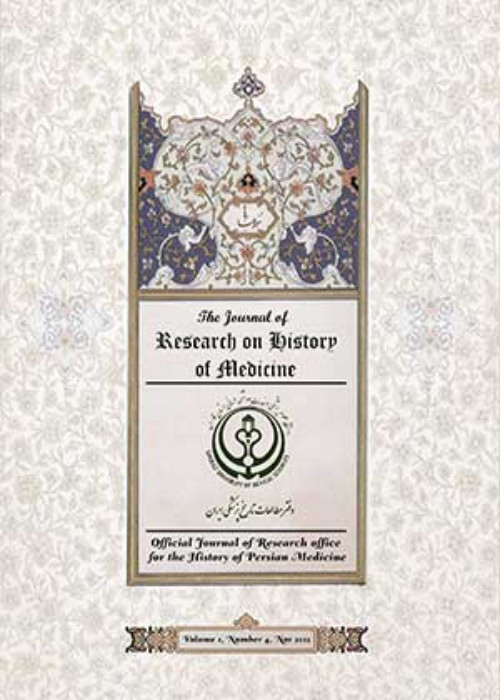فهرست مطالب
Journal of Research on History of Medicine
Volume:7 Issue: 1, Feb 2018
- تاریخ انتشار: 1397/01/07
- تعداد عناوین: 7
-
-
Page 3One of the topics attended by scholars and Islamic physicians has been the knowledge of anatomy. From the beginning of translation movement in the second century, Muslims paid a special attention to this branch of knowledge. Greek physicians works especially Galen, were translated into Arabic and described as infrastructures for the authorship of Muslim physicians works in the field of anatomy. Muslim physicians, while paying attention to the views of Greeks, presented new theories. The most important of these theories concerned Ibn Nafis. His study of blood circulation was a sign of deep investigation by Muslim physicians. In the seventh and eighth centuries, Persian physicians paid much attention to knowledge and wrote several treatises in this regard. For example, Al Mokhtasar fi Tashrih of Abolmajd, al Bayzavi and resale fi tashrih of Najmodin Mahmod ibn Elyas Shirazi and tashrihol Abdan of Mansur ibn Ahmad Shirazi. This research paper is descriptive-analytical in nature and takes a comparative approach. By conformation of these works together, this research considers the most important topics of the above-mentioned scientists about anatomy in Persian physician works.Keywords: Tashrih, Abolmajd al Bayzavi, Najmodin Mahmud ibn Elyas, Mansur ibn Ahmad Shirazi, Tohfate al Sadiye, Ghotbodin al Shirazi
-
Page 17Mursalin (Muslemin) hospital was founded by British physicians in Shiraz. The hospital and its British staff have played an important role in the evolution of medical knowledge and the provision of health services in this city. Before the arrival of Donald Kaar and Emelian Stewart in Shiraz, there was no modern hospital or clinic; health services and pharmaceuticals were traditionally provided by local medicine men. The arrival of British physicians and nurses has not only finished traditional therapies in long term, but also commenced the arrival of modern medical knowledge in Shiraz. This study seeks the answer to this fundamental question that what the causes and factors of the arrival of British physicians and nurses in Shiraz were and what role they have played in providing modern health services in this city. This research is conducted in a descriptive manner along with analysis based on library and documentation resources (National Documentation Center of Iran and Documentation Archive of Birmingham University) as well as field research. The findings of this research demonstrate the beneficial role that British physicians and nurses played in improving peoples health; however, their main goal has been the promotion of Christianity in and around Shiraz.Keywords: Mursalin (Muslemin) Hospital, British Physicians, Donald Kaar, Modern Medicine
-
Page 31This paper explores the style of the book "Favayed Al-afzaliyeh" authored by Ali Afzal Qatea Qazvini. He is one of the renowned and prolific physicians of the Safavid era, who despite medical profession and writing several valuable books, has been paid less attention by researches. Among his writings, "Favayed Al-afzaliyeh" is the Encyclopedia of Medicine and Pharmacology. According to many researchers, this book is the most important, most detailed and most comprehensive medical treatises of the Safavid era. In this paper, the stylistic features of "Favayed Al-afzaliyeh" are studied from the viewpoints of thought, literature and language. The result of this study shows that the above-mentioned book is a moral and advisory work in addition to mentioning comprehensive medical issues; according to its scientific structure, it has excellent literary traits. Linguistic features of this work, despite a relatively long period from Khorasani style, is yet adaptable to it. Of course, this does not mean that style of "Favayed Al-afzaliyeh" is devoid of the linguistic features of its own era.Keywords: traditional medicine, style, safavidera, Favayed Al-afzaliyeh, Ali Afzal Qatea Qazvini
-
Page 47One well-cited assertion in the literature is a lack of data about health,physicians and their lives in Arabian Peninsula in the 7th century, which is expected due to deficiency of original resources from that time. Previous studies identified only three physicians without remarkable data about their lives. This article introduces Abdullah bin Anis, a new physician who was unknown previously and presented novel information about medicine and its practice in Prophet Muhammads time (ca 609).Keywords: Arabic Medicine, Traditional Medicine, History of Medicine, Medieval
-
Page 51Trachoma and its complications, including blindness, is one of the problems that has always threated human society. This disease was known among Iranian physicians since past time in Iran and there had been signs of disease description and its treatment methods in ancient books.
At the beginning of twentieth century, by discovering the cause of the disease, comprehensive actions were taken by Iranian government to eradicate this disease. These actions included public treatment in community as well as health education in schools. Also clinics and ophthalmologists have begun to treat the disease with new methods.
The results of this study based on the study of documents, remaining evidence and the statistics of patients in different regions indicate that although Iranian government managed to control the disease and its complications, but it never succeeded in eradicating Trachoma.


